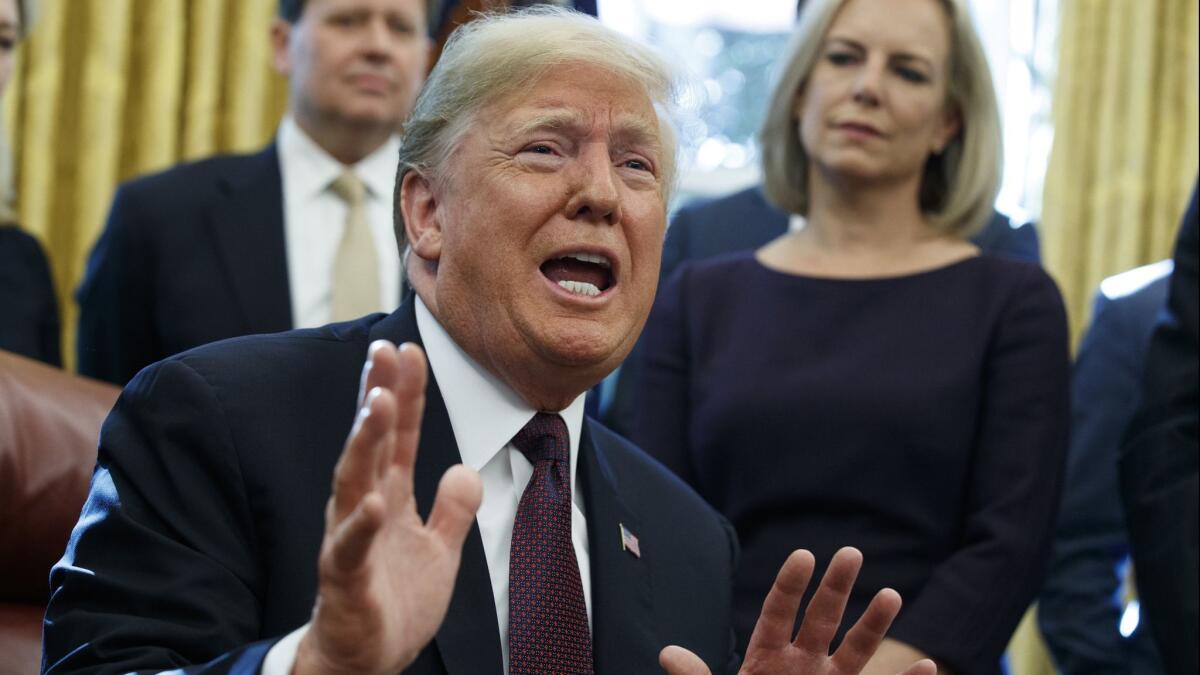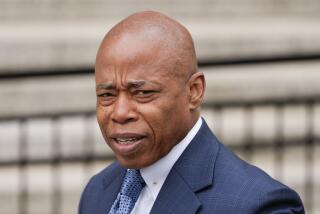Op-Ed: Mueller might soon bring charges that even Trump die-hards can’t trivialize

Commentators predict the next chapter of the Department of Justice’s Russia investigation at their peril, but there is good reason to expect one or more blockbuster developments in the next few weeks.
There are concrete indications that special counsel Robert S. Mueller III is now about the business of laying down the last big pieces of the puzzle of Russian intervention in the 2016 election.
For the record:
10:15 a.m. Nov. 20, 2018An earlier version of this article gave the incorrect first name of political commentator Jerome Corsi, as Joseph.
Mueller already has done the difficult digging on the Russian side of the equation, bringing detailed indictments in February 2018 for a wide-ranging Russian trolling operation related to the campaign, as well as the July 2016 hacking of Democratic Party emails. Now he’s looking to tie those allegations to people close to the Trump campaign.
The upshot may be allegations of “collusion,” of the sort the president has long denied. The actual charges are likely to be one of three criminal conspiracies: violating federal election laws, violating computer laws, or soliciting or receiving something of value from a foreign government. Charges, in other words, that not even the most ardent Trump die-hard could trivialize. They bring with them the possibility that Mueller might opt to name President Trump himself as an unindicted co-conspirator.
Even if Mueller is not about to close up shop, it’s increasingly likely that the full contours of his inquiry will be known to the public by year’s end.
Look first for an indictment against radio commentator Jerome Corsi, who told the world last week that after several months of his cooperating with the probe, Mueller has informed him that he will be charged with “some form of lying” to the Mueller team.
A fabulist, blowhard and general odd duck, Corsi might seem like small quarry for Mueller. But as with Paul Manafort’s lobbying partner Rick Gates, whose cooperation anchored the tax and fraud case against the former Trump campaign manager, Corsi is directly connected to another Trump insider, Roger Stone. Stone was in regular contact with candidate Trump during the campaign, and perhaps with WikiLeaks and its Russian sources.
Stone and Corsi appear to have had advance knowledge of the WikiLeaks October 2016 release of emails from the account of Hillary Clinton campaign chair John Podesta. Both men have indicated that Corsi was the source of Stone’s foolish Twitter boast and prophecy: It would “soon [be] Podesta’s time in the barrel.” Corsi suggests, implausibly, that he just sussed out WikiLeaks’ moves from publicly available sources, and Stone insists his email wasn’t referring to hacking or WikiLeaks anyway. He says he had no advance knowledge of the Podesta reveal.
And yet, given that the first cache from Podesta’s account was released a matter of minutes after the “Access Hollywood” tape sent the Trump campaign reeling, it seems possible the release was a coordinated effort, and Stone could have been the conduit.
Another augury of blockbuster developments: Mueller last week filed a statement in the District of Columbia court that is overseeing the case of Manafort, who awaits sentencing on his tax and fraud conviction. Mueller requested a 10-day delay in submitting a status report on the ground that the later report would “be of greater assistance” to the court’s work determining what sentence Manafort deserves. Mueller’s request strongly suggests that we’ll soon see important additional information bearing on the value of Manafort’s cooperation, up to and including a potential role as a key witness in a soon-to-be-unveiled criminal case.
The whole point of the enormous pressure Mueller brought to bear against Manafort was to shake loose information about persons above him in the food chain. Those are very few, arguably only Donald Trump Jr., Jared Kushner or Trump himself (who we know believes that Manafort could incriminate him).
Enter the Fray: First takes on the news of the minute from L.A. Times Opinion »
Finally, Mueller’s team is scheduled to file a long-delayed court memorandum Dec. 4, laying out its view of the value of the cooperation of former national security advisor Michael Flynn, who pleaded guilty more than a year ago to lying about his contacts with a Russian official. His sentencing was put off four times as the prosecutors continued to develop new cases and charges based on the information he provided. That they are now prepared to close the books suggests that they will be informing the court, and thus the public, of the full extent of his cooperation, including imminent new charges or charges that have been filed under seal.
None of this constitutes a forecast that, as Team Trump is fond of suggesting, Mueller’s probe or its consequences are near an end. If any of the as-yet uncharged cooperating defendants opts to go to trial, that process will take at least many months. And we likely have not seen the end of Mueller’s efforts to secure information — or, preferably, testimony — from the president. Trump’s answers to Mueller’s initial written questions are supposed to be submitted to the investigators this week, but they won’t begin to provide a satisfactory account of the president’s conduct and mental state.
Even if Mueller is not about to close up shop, it is increasingly likely that the full contours of his inquiry will be sketched out and known to the public by year’s end. For the president and his circle, it is not shaping up to be a pretty picture.
Harry Litman, a former deputy assistant attorney general, teaches constitutional law at UC San Diego and UCLA.
Follow the Opinion section on Twitter @latimesopinion and Facebook
More to Read
A cure for the common opinion
Get thought-provoking perspectives with our weekly newsletter.
You may occasionally receive promotional content from the Los Angeles Times.










